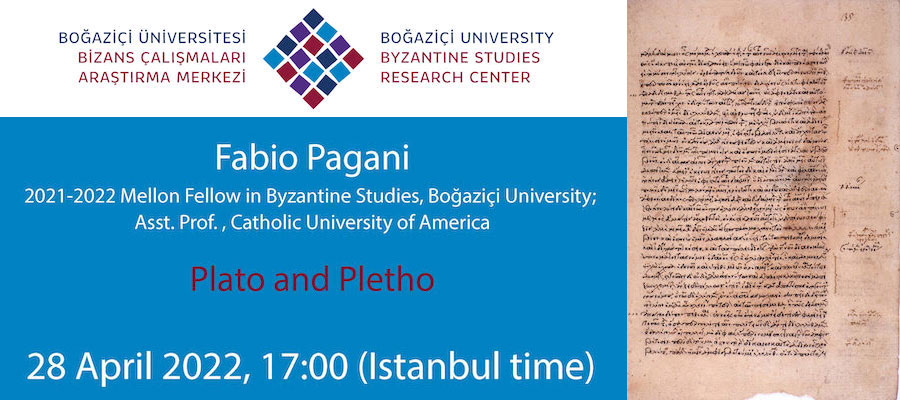Plato and Pletho, lecture by Fabio Pagani (Boğaziçi University), Boğaziçi University and Zoom, April 28, 2022, 5:00 pm (Istanbul)
Even though the existence of a Byzantine philosophy is currently a matter of disagreement among specialists, a general scholarly consensus ranks Gemistos Pletho as the most original thinker of Late Byzantium. Still, the core of his philosophical thought has been interpreted in different and often conflicting ways, even in recent years. The main problem that has split modern interpreters is the issue of Gemistos’ religious outlook, i.e. his alleged paganism. Against conflicting (and often a-priori) philosophical and theological interpretations, the goal of this lecture, part of an ongoing book-project, is to present a paleographical and philological analysis of Gemistos’ own books, especially his working edition of Plato (in three volumes). Far from being a place where pagan gods were worshipped, the analysis of the manuscript evidence shows that the school of Mystra can be seen as a place where (often difficult) texts of classical literature were read, copied, and interpreted in the light of the philosophical ideas of Gemistos Pletho. In particular, the lecture will focus on the twofold evidence that can be drawn from Gemistos’ book. On the one hand, they contain smart conjectures to ancient texts in Gemistos’ hand, therefore providing substantial evidence that he was a gifted philologist, able to emend classical texts in ways that have been affecting both the manuscript transmission and modern critical editions. On the other hand, these books contain also arbitrary erasures of the text, intended to make it consistent with some of the ideas contained in the Nomoi, Gemistos’ most controversial treatise. Puzzling though it may seem to modern scholars, the lecture will argue that in Gemistos’ mind both corrections intended to restore in the text a form of philosophical truth which represented the essence of his own distinctive form of Platonism.
Fabio Pagani is currently an A. W. Mellon Fellow in Byzantine Studies at the Boğaziçi University Byzantine Studies Research Center, where he is working on a book-project on Gemistos Pletho's distinctive form of Platonism.
Advance registration required.
